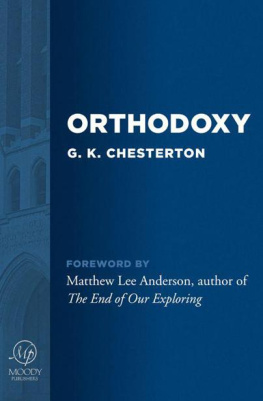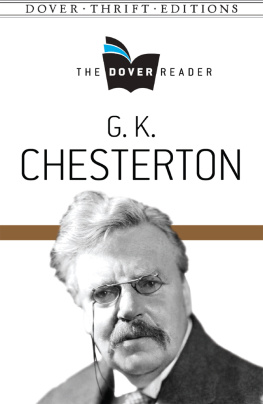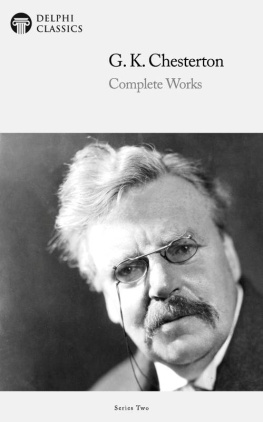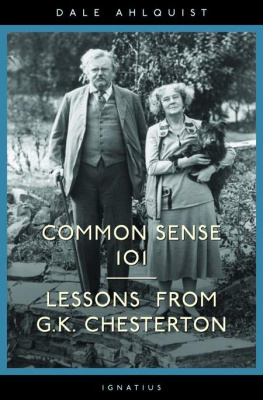WHAT'S WRONG WITH THE WORLD
By G.K. Chesterton
CONTENTS
DEDICATION
To C. F G. Masterman, M. P.
My Dear Charles,
I originally called this book "What is Wrong," and it would
have satisfied your sardonic temper to note the number of social
misunderstandings that arose from the use of the title. Many a mild lady
visitor opened her eyes when I remarked casually, "I have been doing
'What is Wrong' all this morning." And one minister of religion moved
quite sharply in his chair when I told him (as he understood it) that I
had to run upstairs and do what was wrong, but should be down again in
a minute. Exactly of what occult vice they silently accused me I cannot
conjecture, but I know of what I accuse myself; and that is, of having
written a very shapeless and inadequate book, and one quite unworthy
to be dedicated to you. As far as literature goes, this book is what is
wrong and no mistake.
It may seem a refinement of insolence to present so wild a composition
to one who has recorded two or three of the really impressive visions of
the moving millions of England. You are the only man alive who can
make the map of England crawl with life; a most creepy and enviable
accomplishment. Why then should I trouble you with a book which, even
if it achieves its object (which is monstrously unlikely) can only be a
thundering gallop of theory?
Well, I do it partly because I think you politicians are none the worse
for a few inconvenient ideals; but more because you will recognise the
many arguments we have had, those arguments which the most wonderful
ladies in the world can never endure for very long. And, perhaps, you
will agree with me that the thread of comradeship and conversation must
be protected because it is so frivolous. It must be held sacred, it
must not be snapped, because it is not worth tying together again. It
is exactly because argument is idle that men (I mean males) must take it
seriously; for when (we feel), until the crack of doom, shall we have so
delightful a difference again? But most of all I offer it to you because
there exists not only comradeship, but a very different thing, called
friendship; an agreement under all the arguments and a thread which,
please God, will never break.
Yours always,
G. K. Chesterton.
PART ONE. THE HOMELESSNESS OF MAN
I. THE MEDICAL MISTAKE
A book of modern social inquiry has a shape that is somewhat sharply defined. It begins as a rule with an analysis, with statistics, tables of population, decrease of crime among Congregationalists, growth of hysteria among policemen, and similar ascertained facts; it ends with a chapter that is generally called "The Remedy." It is almost wholly due to this careful, solid, and scientific method that "The Remedy" is never found. For this scheme of medical question and answer is a blunder; the first great blunder of sociology. It is always called stating the disease before we find the cure. But it is the whole definition and dignity of man that in social matters we must actually find the cure before we find the disease.
The fallacy is one of the fifty fallacies that come from the modern madness for biological or bodily metaphors. It is convenient to speak of the Social Organism, just as it is convenient to speak of the British Lion. But Britain is no more an organism than Britain is a lion. The moment we begin to give a nation the unity and simplicity of an animal, we begin to think wildly. Because every man is a biped, fifty men are not a centipede. This has produced, for instance, the gaping absurdity of perpetually talking about "young nations" and "dying nations," as if a nation had a fixed and physical span of life. Thus people will say that Spain has entered a final senility; they might as well say that Spain is losing all her teeth. Or people will say that Canada should soon produce a literature; which is like saying that Canada must soon grow a new moustache. Nations consist of people; the first generation may be decrepit, or the ten thousandth may be vigorous. Similar applications of the fallacy are made by those who see in the increasing size of national possessions, a simple increase in wisdom and stature, and in favor with God and man. These people, indeed, even fall short in subtlety of the parallel of a human body. They do not even ask whether an empire is growing taller in its youth, or only growing fatter in its old age. But of all the instances of error arising from this physical fancy, the worst is that we have before us: the habit of exhaustively describing a social sickness, and then propounding a social drug.
Now we do talk first about the disease in cases of bodily breakdown; and that for an excellent reason. Because, though there may be doubt about the way in which the body broke down, there is no doubt at all about the shape in which it should be built up again. No doctor proposes to produce a new kind of man, with a new arrangement of eyes or limbs. The hospital, by necessity, may send a man home with one leg less: but it will not (in a creative rapture) send him home with one leg extra. Medical science is content with the normal human body, and only seeks to restore it.
But social science is by no means always content with the normal human soul; it has all sorts of fancy souls for sale. Man as a social idealist will say "I am tired of being a Puritan; I want to be a Pagan," or "Beyond this dark probation of Individualism I see the shining paradise of Collectivism." Now in bodily ills there is none of this difference about the ultimate ideal. The patient may or may not want quinine; but he certainly wants health. No one says "I am tired of this headache; I want some toothache," or "The only thing for this Russian influenza is a few German measles," or "Through this dark probation of catarrh I see the shining paradise of rheumatism." But exactly the whole difficulty in our public problems is that some men are aiming at cures which other men would regard as worse maladies; are offering ultimate conditions as states of health which others would uncompromisingly call states of disease. Mr. Belloc once said that he would no more part with the idea of property than with his teeth; yet to Mr. Bernard Shaw property is not a tooth, but a toothache. Lord Milner has sincerely attempted to introduce German efficiency; and many of us would as soon welcome German measles. Dr. Saleeby would honestly like to have Eugenics; but I would rather have rheumatics.
This is the arresting and dominant fact about modern social discussion; that the quarrel is not merely about the difficulties, but about the aim. We agree about the evil; it is about the good that we should tear each other's eyes out. We all admit that a lazy aristocracy is a bad thing. We should not by any means all admit that an active aristocracy would be a good thing. We all feel angry with an irreligious priesthood; but some of us would go mad with disgust at a really religious one. Everyone is indignant if our army is weak, including the people who would be even more indignant if it were strong. The social case is exactly the opposite of the medical case. We do not disagree, like doctors, about the precise nature of the illness, while agreeing about the nature of health. On the contrary, we all agree that England is unhealthy, but half of us would not look at her in what the other half would call blooming health. Public abuses are so prominent and pestilent that they sweep all generous people into a sort of fictitious unanimity. We forget that, while we agree about the abuses of things, we should differ very much about the uses of them. Mr. Cadbury and I would agree about the bad public house. It would be precisely in front of the good public-house that our painful personal fracas would occur.















